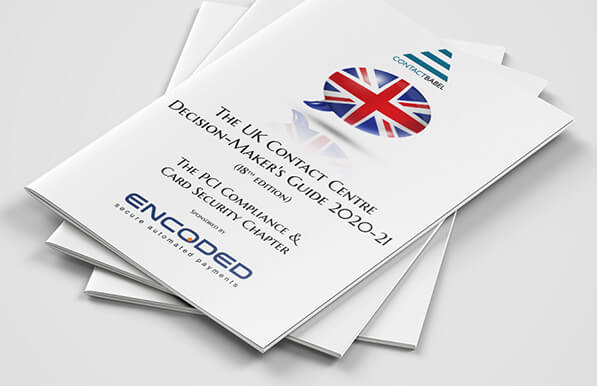The latest UK Contact Centre Decision Makers Guide (DMG) reports on the current trends in what has been a challenging year for contact centres. Rob Crutchington takes a closer look at how businesses are tackling card fraud reduction and security.
One of the largest and most comprehensive studies of all aspects of the UK contact centre industry, the ContactBabel DMG reports on the performance, technology and HR aspects of UK contact centre operations. The results of the most recent questionnaire (from a random sample across different vertical sectors) was carried out in November 2020, highlighting trends and changes in the industry.
The DMG presents a comprehensive view of how contact centres have been tackling the challenges of balancing compliance with customer service during a difficult year. PCI DSS Compliance and Card Security continue to be an important aspect of contact centre operations to secure card data and improve the customer experience.
The following points highlight noteworthy changes in how businesses are providing secure payment for customers:
1. New entrant of secure payment by link
This year 5% of respondents reported using a secure payment link by SMS or Email as a way to reduce card fraud when presented with a list of solutions, approaches and business processes.
This is the first year for this payment link option, which is a self-service method of card fraud reduction and involves customers being sent an SMS, email or WhatsApp link to open a secure form to then enter their card details. It reduces agent time and allows customers to pay at their own convenience, although it is possibly more suitable for certain demographics.
2. Agent Assisted Payments with pause and resume recording continues to rank highly
Looking at trends over previous years, pause and resume recording (used by 68% of respondents), followed by improving processes and training (53%), continue to be the most popular methods used to reduce card fraud.
3. An increase in the use of IVR and Agent Assist Payments
The figures for IVR demonstrate that it remains a popular method of providing a secure way to pay, especially for respondents with large contact centres. Often referred to as agent assisted IVR, mid-call IVR shows an increase in use, up to 18% from the previous year’s 16%, with an increase to 4% in the use of post-call IVR. Viewed as a more customer-friendly approach, mid-call IVR allows a caller to ask additional questions and enables agents to give reassurance and confirmation after the payment about delivery times or other queries.
4. Visa Global Registry of Service Providers
Replacing Visa’s Europe Merchant Agent listing, this Registry is the payment industry’s designated source for information on registered and compliant companies that provide payment-related services to Visa clients and merchants.
There are now just two levels for payment service providers, rather than four. A Level 1 Service Provider stores, processes, or transmits more than 300,000 Visa credit card transactions annually, while a Level 2 Service Provider less than 300,000 Visa transactions annually. The PCI DSS compliance requirements are also different (detailed in the report).
Providing secure payments is still a key factor to ensure buyer confidence and trust and the latest DMG provides useful insights into the areas that companies are investing in to protect customer details and ensure PCI DSS compliance. As well as deploying the latest technologies, using a trusted payments services provider can help merchants provide fully secure payment options that reduce fraud and ensure customers feel more secure in handing over their personal data.
(i). UK Contact Decision Makers Guide 2020-2021 (18th Edition), published by ContactBabel.
(ii). Taking a random sample of the industry, a detailed structured questionnaire was answered by 233 contact centre managers and directors in September and October 2020.
Download the UK Contact Centre Decision Makers Guide (DMG)






